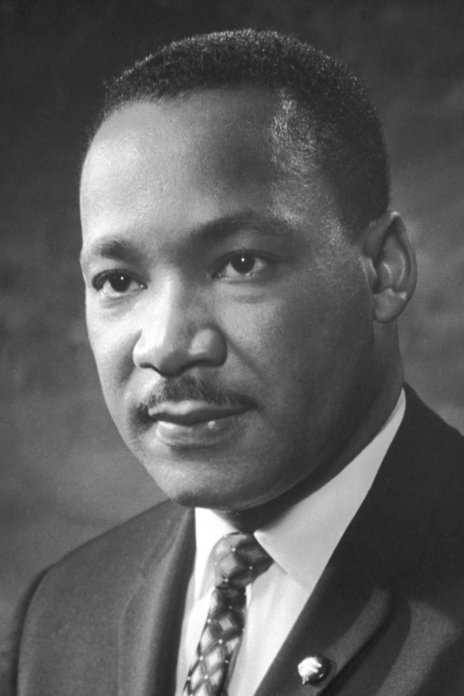Martin Luther King frasi celebri

Martin Luther King Frasi e Citazioni
da La forza di amare
La forza di amare
da La forza di amare
La forza di amare
Il sogno della non violenza
Citazioni di Martin Luther King
p. 234 sg.
Citazioni di Martin Luther King
Origine: Dal discorso al Lincoln Memorial di Washington, 28 agosto 1963; citato in Ferdie Addis, I have a dream. I discorsi che hanno cambiato la storia, traduzione di Valeria Bastia, De Agostini, Novara, 2012, p. 104 http://books.google.it/books?id=obMxU4M4kQ4C&pg=PT104. ISBN 978-88-418-7870-5
“La chiesa […] non è la padrona o la serva dello stato, ma la coscienza dello stato.”
da La forza d'amare
La forza di amare
“La salvezza dell'uomo è nelle mani dei disadattati creativi.”
da La forza d'amare
La forza di amare
“Ignorare il male equivale ad esserne complici.”
da Il sogno della non violenza. Pensieri
Il sogno della non violenza
Citazioni di Martin Luther King
Citazioni di Martin Luther King
Citazioni di Martin Luther King
Origine: Citato in Teresio Bosco, Uomini come noi, Società Editrice Internazionale, Torino, 1968.
“Questo 4 di luglio è vostro, non mio.”
da Il sogno della non violenza. Pensieri
Il sogno della non violenza
Origine: Lettera a un amico antisionista è una lettera aperta erroneamente attribuita a Martin Luther King. Cfr. Letter to an Anti-Zionist Friend.
Origine: Citazioni erroneamente attribuite, p. 234
Origine: Citazioni erroneamente attribuite, p. 234
Citazioni di Martin Luther King
Origine: Da The Words of Martin Luther King Jr., New Market Press, New York, 1983, p. 71; citato in Dennis Dalton, Gandhi, il Mahatma: il potere della nonviolenza, traduzione di Andrea Boni, ECIG, Genova, 1998, p. 13. ISBN 88-7545-842-1
Citazioni di Martin Luther King
Citazioni di Martin Luther King
Citazioni di Martin Luther King
Origine: Citato in AA.VV. 2018, p. 320.
“Cristo ci ha dato gli obiettivi, Mahatma Gandhi la tattica.”
Citazioni di Martin Luther King
Origine: Citato in AA.VV. 2018, p. 225.
Martin Luther King: Frasi in inglese
Interview in Playboy (January 1965) https://web.archive.org/web/20080706183244/http://www.playboy.com/arts-entertainment/features/mlk/04.html
1960s
1960s, The Drum Major Instinct (1968)
"Social Justice and the Emerging New Age" address at the Herman W. Read Fieldhouse, Western Michigan University (18 December 1963)
1960s
1960s, The Rising Tide of Racial Consciousnes (1960)
How long? Not long, because "you shall reap what you sow."
1960s, How Long, Not Long (1965)
1960s, Where Do We Go from Here: Chaos or Community? (1967)
1960s, Address to Local 815, Teamsters and the Allied Trades Council (1967)
1950s, Conquering Self-centeredness (1957)
1950s, Rediscovering Lost Values (1954)
1950s, Conquering Self-centeredness (1957)
A Knock on Midnight http://mlk-kpp01.stanford.edu/index.php/encyclopedia/multimediaentry/doc_a_knock_at_midnight/
1960s, Strength to Love (1963)
1960s, A Christmas Sermon (1967)
1960s, The Role of the Behavioral Scientist in the Civil Rights Movement (1967)
1960s, Why I Am Opposed to the War in Vietnam (1967)
This group said in substance that "We will go on in spite of...," that "We will not allow anything to stop us," that "We will move on amid the difficulties, amid the trials, amid the tribulations."
1960s, Keep Moving From This Mountain (1965)
1950s, Give Us the Ballot (1957)
1960s, Why Jesus Called A Man A Fool (1967)
1950s, Conquering Self-centeredness (1957)
1960s, Family Planning - A Special and Urgent Concern (1966)
1960s, Where Do We Go from Here: Chaos or Community? (1967)
1960s, The Drum Major Instinct (1968)
Interview in Playboy (January 1965) https://web.archive.org/web/20080706183244/http://www.playboy.com/arts-entertainment/features/mlk/04.html
1960s
1950s, Conquering Self-centeredness (1957)
1960s, Why Jesus Called A Man A Fool (1967)
Undated manuscript, "The Eternal Significance of Christ", an outline of a sermon on 2 Corinthians, at the King Center http://www.thekingcenter.org/archive/document/eternal-significance-christ
King sharing his thoughts on the U.S. Supreme Court's decision to ban school prayer, ** Interview in Playboy (January 1965) https://web.archive.org/web/20080706183244/http://www.playboy.com/arts-entertainment/features/mlk/04.html
1960s
1960s, The Rising Tide of Racial Consciousnes (1960)
1960s, (1963)
